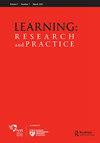Facing the challenges of the future of education
Q2 Social Sciences
引用次数: 0
Abstract
The nature of work is changing, perhaps at a pace that we have not fully grasped. While no one is certain about the kind of work that will exist in the future, what is clear is that many of the manual, repetitive work will be replaced by automation and Artificial Intelligence. Faced with an uncertain tomorrow, there is an urgent need to transform education to prepare the people for the future of work. The articles in this issue of Learning: Research and Practice address some of the concerns related to the future of education. In the face of job replacement and job extinction in the future, professional skills are no longer sufficient to navigate in this VUCA (volatile, uncertain, complex, and ambiguous) world. It is equally, if not more important, for individuals to develop intrapersonal competencies (National Research Council [NRC], 2012). Often considered as soft-skills, they include attributes such as curiosity, imagination, resilience, and self-regulated learning (OECD, 2018) needed to prepare them for jobs that are not yet created. The importance of developing soft skills in our future workers is highlighted in two of the articles on selfregulated learning in this issue. The first article is “Investigating students’ situation-specific emotional state and motivational goals during a learning project within one primary school classroom” by Järvenoja. The study examines how primary school students’ emotional state and motivational goals (situational motivation) fluctuated while working on a 2-month-long project, and how these goals were connected with students’ descriptions of motivation regulation strategies and learning outcomes. One interesting finding of the study is that students’ ability to recognise different regulatory strategies need not necessarily lead to actualised regulation. Qualitative difference was also found in students’ use of regulatory strategies and their levels of awareness of theirmotivation and emotional state. These findings highlight the importance of increasing students’ awareness of their emotional state and motivational goals if perseverance in learning is desired. The second article on the topic of self-regulation is “Metacognition, calibration and self-regulated learning: An exploratory study of undergraduates in a Business School” by Stoten. Focusing on undergraduates in a business programme at a university, this study investigated the impact of learning diary as a tool to engender metacognitive awareness. Findings show that while the students might develop a sense of metacognitive experience/mastery in using a learning diary, their diary entries indicated that they might not have developed metacognitive knowledge, and were even less aware of how to develop metacognitive skills. If soft skills like self-regulatory learning are key in preparing individuals for the future of work, these two articles signal the need for more research to look into how learners’ awareness of their self-regulatory state can be improved, and how self-regulatory knowledge and strategies can be developed. The uncertain landscape of the future of work has increased the demands on teachers tremendously. Teachers need to embrace and adapt to the constant eco-systemic changes in education (OECD, 2018). As the key to quality learning lies with the teachers (OECD, 2005), two articles in this issue direct the spotlight on the key agents of education change. LEARNING: RESEARCH AND PRACTICE 2019, VOL. 5, NO. 1, 1–3 https://doi.org/10.1080/23735082.2019.1585120面对未来教育的挑战
工作的性质正在发生变化,也许变化的速度我们还没有完全掌握。虽然没有人确定未来会有什么样的工作,但可以肯定的是,许多手动、重复的工作将被自动化和人工智能所取代。面对不确定的明天,迫切需要改革教育,使人们为未来的工作做好准备。本期《学习:研究与实践》的文章讨论了与教育未来有关的一些问题。面对未来的工作替代和工作灭绝,专业技能不再足以在这个VUCA(易变、不确定、复杂和模糊)的世界中导航。对于个人来说,培养个人能力同样重要(如果不是更重要的话)(国家研究委员会,2012)。它们通常被视为软技能,包括好奇心、想象力、适应力和自我调节学习等属性(经合组织,2018年),这些属性需要他们为尚未创造的工作做好准备。本期关于自我调节学习的两篇文章强调了培养未来员工软技能的重要性。第一篇文章是“在一个小学课堂学习项目中调查学生的情境特定情绪状态和动机目标”,作者:Järvenoja。本研究考察了小学生在为期两个月的项目中情绪状态和动机目标(情境动机)的波动情况,以及这些目标与学生对动机调节策略和学习成果的描述之间的关系。这项研究的一个有趣发现是,学生识别不同监管策略的能力不一定会导致实施监管。学生对调节策略的使用以及对动机和情绪状态的认知水平也存在质的差异。这些发现强调了提高学生对自己的情绪状态和动机目标的认识的重要性,如果想要坚持学习。第二篇关于自我调节的文章是Stoten的《元认知、校准与自我调节学习:对商学院本科生的探索性研究》。本研究以一所大学商科专业的本科生为研究对象,探讨了学习日记作为培养元认知意识的工具的影响。研究结果表明,虽然学生在使用学习日记的过程中可能会发展出一种元认知经验/精通感,但他们的日记条目表明,他们可能没有发展出元认知知识,甚至不知道如何发展元认知技能。如果像自我调节学习这样的软技能是让个人为未来的工作做好准备的关键,那么这两篇文章表明,需要进行更多的研究,研究如何提高学习者对自我调节状态的认识,以及如何开发自我调节知识和策略。未来工作的不确定性极大地增加了对教师的需求。教师需要接受并适应教育中不断变化的生态系统(OECD, 2018)。由于优质学习的关键在于教师(OECD, 2005),本期的两篇文章将重点放在教育变革的关键因素上。《学习:研究与实践》2019年第5卷第1期1,1 - 3 https://doi.org/10.1080/23735082.2019.1585120
本文章由计算机程序翻译,如有差异,请以英文原文为准。
求助全文
约1分钟内获得全文
求助全文

 求助内容:
求助内容: 应助结果提醒方式:
应助结果提醒方式:


